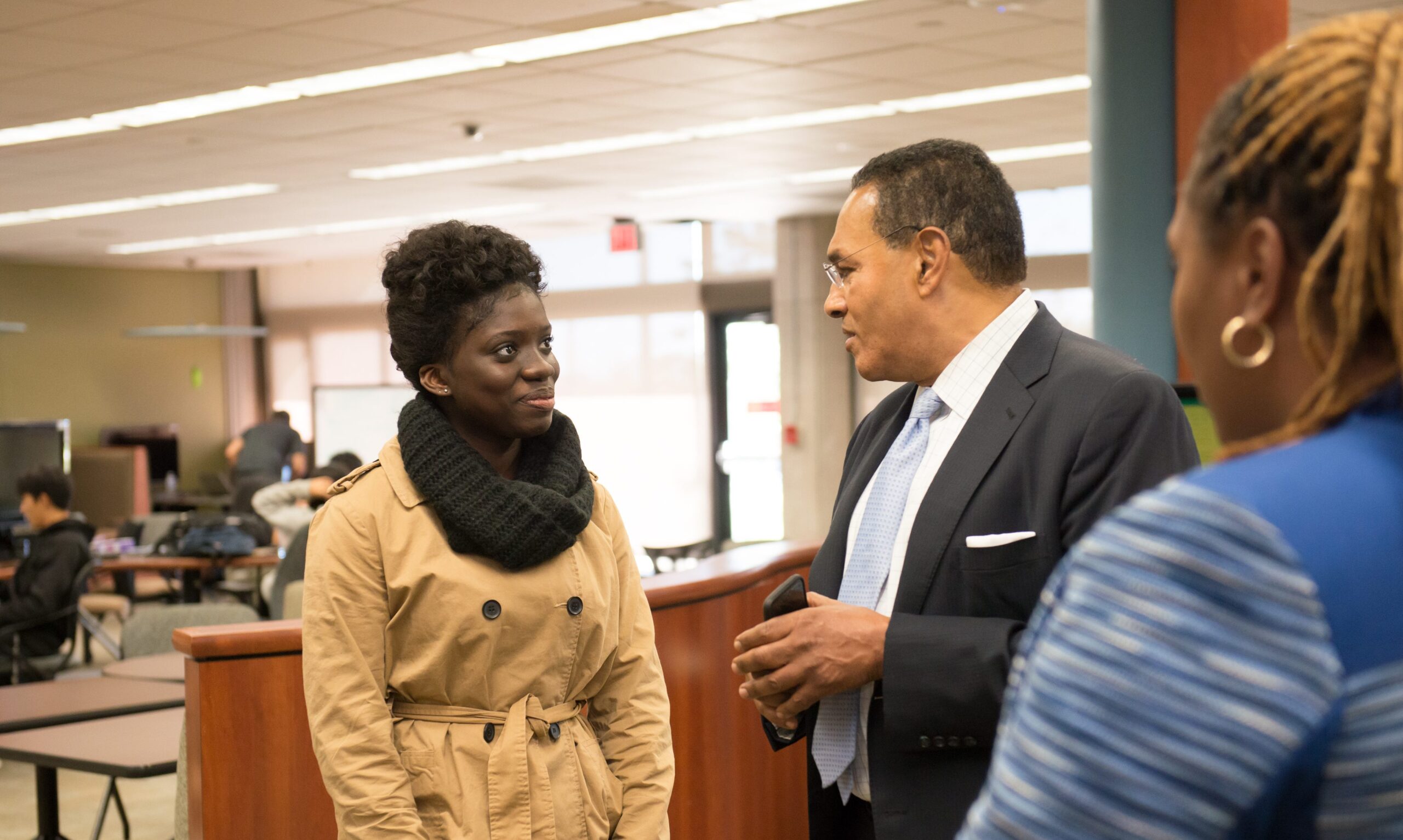The American Association of Medical Colleges (AAMC) has published a new article by UMBC President Freeman Hrabowski and Peter Henderson, senior advisor to the president, emphasizing the need for more scientists from underrepresented minority groups in research and health careers. The piece also details how UMBC’s Meyerhoff Scholars Program serves as a gold-standard model in addressing this national need.
Recent AAMC data reveal that UMBC is the #1 producer of African American undergraduates who go on to enroll in M.D./Ph.D. programs, and the Meyerhoff Scholars Program is a major factor in that achievement. Meyerhoff alumni are more than five times as likely to graduate from or be enrolled in a STEM Ph.D. or M.D./Ph.D. program as students who were accepted to the program but chose not to attend, say Pres. Hrabowski and Henderson.
“Our program is successful in part because of its core principle,” they suggest. “The university is responsible for supporting student success, not weeding students out.”
The Meyerhoff Scholars Program emphasizes mentorship, student research, and a sense of community, while also providing financial support. “These components help students develop a vision of themselves based on high expectations,” the authors explain.
The program invites applicants from all underrepresented groups in STEM, including low-income and first-generation college students. Among over 1,000 Meyerhoff alumni are more than 230 who have already completed Ph.D.s.
Program alumni include people like Kafui Dzirasa ’01, chemical engineering, now an assistant professor at Duke University and recipient of the Presidential Early Career Award for Scientists and Engineers from President Obama. Dzirasa will return to UMBC February 20 to kick off Engineers Week, along with his brother Delali Dzirasa ’04, computer engineering, a Meyerhoff alumnus whose cybersecurity company, housed in the bwtech@UMBC Research and Technology Park, was named 2016 Design/Development Firm of the Year at Baltimore Innovation Week.
The Meyerhoff Scholars Program has also increasingly had an impact beyond the students it touches directly. A 2011 report by the National Academies of Sciences, Engineering, and Medicine found that two-thirds of all students left a STEM major within the first two years, even if they were high achievers previously. With this knowledge in mind, UMBC has created a range of new student programs that offer supports found to be successful in the Meyerhoff Scholars Program to students across populations and disciplines, from the Center for Women in Technology Scholars to UMBC’s intensive, research-driven version of the national MARC U*STAR Scholars program.
Recently, STEM BUILD launched at UMBC with an $18 million grant from the NIH. The initiative’s motto? “Think 500, not 50.” Beyond being a program that offers student support, BUILD is a research study working to create a model for universities to provide comprehensive support on a large scale without requiring a high level of additional resources.
The Meyerhoff Scholars Program has also served as a model to other institutions. Penn State and the University of North Carolina–Chapel Hill have been working since 2014 to adapt the program to their universities, through support from the Howard Hughes Medical Institute.
Michael Summers, Robert E. Meyerhoff Chair for Excellence in Research and Mentoring and University Distinguished Professor of chemistry and biochemistry at UMBC, has played a major role in this expansion of the vision for the scholars program, and he’s driven by the massive societal impacts he believes it can achieve.
“Significant racial/ethnic health disparities persist,” Summers says, “and African American research scientists are the ones most likely to tackle diseases that disproportionately affect the black community.”
“The ultimate goal,” write Pres. Hrabowski and Henderson, in their AAMC article, “is to help these students eventually improve the health of African American and other minority communities, as well as the nation as a whole.”
Read “How undergraduate programs can boost minority success in medical school.”
Image: President Hrabowski talks with a UMBC student in the Retriever Learning Center; photo Marlayna Demond ’11 for UMBC.
Tags: CNMS, COEIT, CWIT, Hrabowski, marcustar, MeyerhoffScholars, STEMBUILD

